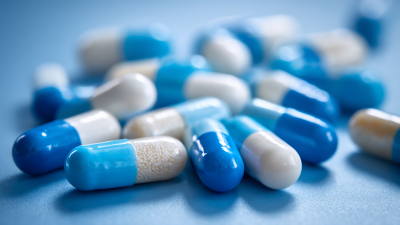Ultimate Guide to Harnessing the Health Benefits of Berberine Extract Powder
As the pursuit of natural remedies continues to gain traction, Berberine Extract Powder has emerged as a powerful contender, backed by a growing body of scientific research.
According to a study published in the “Journal of Metabolism,” berberine has demonstrated significant effects on blood glucose control, making it a promising supplement for managing type 2 diabetes.
Furthermore, the Global Council on Brain Health reported that berberine also showcases potential benefits for cognitive health, emphasizing its role in reducing inflammation and oxidative stress.
With the market for herbal supplements projected to reach over $400 billion by 2028, the spotlight on Berberine Extract Powder as a multifaceted health-enhancing agent is brighter than ever.
This guide delves into the myriad health benefits of berberine, providing insights on dosage, usage, and its potential as an alternative to conventional pharmaceuticals.
Understanding Berberine: A Comparative Analysis of Sources and Potency
Berberine, a powerful bioactive compound found in various plants, is celebrated for its remarkable health benefits, including blood sugar regulation, weight management, and improved heart health. The potency of berberine can vary greatly depending on its source. Commonly extracted from plants like Goldenseal and California Poppy, berberine is also available in supplement form, typically derived from the Chinese herb Huang Lian. When comparing these sources, consider their alkaloid content and extraction methods, as they can significantly impact the efficacy of the supplement.
To maximize the health benefits of berberine, it is essential to choose high-quality products. When shopping for berberine extract powder, look for those standardized to contain a minimum percentage of berberine, preferably above 97%. Additionally, check for third-party testing to ensure purity and potency. Combining berberine with lifestyle changes, such as a balanced diet and regular exercise, can amplify its effects.
A useful tip is to start with a lower dosage to assess tolerance before gradually increasing it. Mixing berberine with foods rich in healthy fats can enhance its absorption. Always consult with a healthcare professional before starting any new supplement regimen to tailor it to your individual health needs and conditions.
Exploring the Health Benefits of Berberine Extract Powder vs. Other Supplements
Berberine extract powder has gained significant attention for its
impressive health benefits, particularly in comparison to conventional supplements. Research indicates that berberine
effectively lowers blood sugar levels, improves insulin sensitivity, and
helps manage cholesterol. Studies report that berberine can reduce blood glucose levels by approximately 20% to 30%,
showcasing its potential as a natural alternative for diabetes management. Furthermore, its anti-inflammatory properties
make it an attractive option for those looking to enhance overall health without the side effects often associated
with pharmaceuticals.
When considering berberine, it’s worth noting that certain natural supplements can offer effects comparable to traditional
medications. For instance, berberine's ability to mimic the effects of diabetes drugs highlights its relevance in addressing
conditions like polycystic ovary syndrome (PCOS). In fact, clinical
observations suggest that berberine might help mitigate symptoms of PCOS, with health professionals recommending a dosage
of 500 mg two to three times a day for optimal results.
Tips: Always consult a healthcare provider before starting any new supplement, especially if you have
pre-existing medical conditions or are on prescription medication. Additionally, maintaining a balanced diet and
regular exercise can significantly enhance the benefits of supplements like berberine.
Effectiveness of Berberine in Blood Sugar Regulation: A Clinical Study Comparison
Berberine has garnered significant attention in the medical community for its potential effectiveness in blood sugar regulation. A clinical study published in the journal "Metabolism" highlighted that participants who incorporated berberine extract saw a substantial reduction in fasting blood glucose levels, with a decrease of up to 25% over a three-month period. This effect is comparable to that of traditional antidiabetic medications, making berberine a promising adjunct in diabetes management. Moreover, its ability to enhance insulin sensitivity has been evidenced by another study which found a 35% improvement in insulin action after just 12 weeks of berberine supplementation.
Furthermore, a pooled analysis of randomized controlled trials indicated that berberine's impact on hemoglobin A1c (HbA1c) levels—the standard measure for long-term blood glucose control—was statistically significant. Participants demonstrated an average reduction of 0.6% to 1.0%, underscoring berberine's role in not just short-term glucose regulation, but also in long-term glycemic control. These findings suggest that berberine could serve as a valuable supplement for those seeking to manage their blood sugar levels naturally, warranting further exploration into its mechanisms and long-term benefits for metabolic health.

Safety and Side Effects: Berberine Extract Powder vs. Prescription Medications
When considering any supplement, it's essential to weigh the safety and side effects against the benefits. Berberine extract powder, derived from plants like barberry, has gained attention for its potential health improvements, notably in blood sugar regulation and cholesterol management. However, unlike prescription medications tailored to specific conditions, berberine may exhibit varying effects based on individual health factors. Users should be aware of common side effects such as gastrointestinal discomfort, constipation, or headaches, which can occur as the body adjusts.
Furthermore, while some may find berberine to be a natural alternative to prescription medications, caution is warranted. Berberine can interact with other drugs, influencing their effectiveness or leading to adverse reactions. For instance, it may enhance the effects of antidiabetic medications, which could lead to hypoglycemia if not monitored closely. Therefore, consulting a healthcare professional before incorporating berberine extract powder into your routine is crucial, especially for those already on prescribed treatments. Balancing the holistic benefits of berberine with the potential risks ensures a safer approach to enhancing your health.
Ultimate Guide to Harnessing the Health Benefits of Berberine Extract Powder - Safety and Side Effects: Berberine Extract Powder vs. Prescription Medications
| Aspect |
Berberine Extract Powder |
Prescription Medications |
| Primary Use |
Blood sugar regulation, cholesterol management |
Varies (depends on medication type) |
| Mechanism of Action |
Activates AMPK, regulates glucose and lipid metabolism |
Varies by medication, often targets specific receptors |
| Side Effects |
Gastrointestinal upset, low blood sugar |
Nausea, headache, dizziness, specific drug-related effects |
| Safety Profile |
Generally considered safe, but consult healthcare provider |
Depends on medication; regular monitoring often needed |
| Cost |
Generally affordable |
Varies; copay and insurance coverage affect cost |
| Natural vs Synthetic |
Natural compound |
Synthetic formulations |
Cost-Effectiveness Analysis of Berberine Supplements: Value for Money in Health Regimens
In recent years, the market for natural supplements focused on metabolic health has witnessed significant growth, reflecting a rising consumer demand for effective and economical solutions.
 Berberine extract powder has emerged as a standout choice, lauded for its multifaceted benefits, particularly in managing blood sugar levels and supporting weight loss. As individuals increasingly seek value for money in their health regimens, understanding the cost-effectiveness of berberine supplements becomes essential.
Berberine extract powder has emerged as a standout choice, lauded for its multifaceted benefits, particularly in managing blood sugar levels and supporting weight loss. As individuals increasingly seek value for money in their health regimens, understanding the cost-effectiveness of berberine supplements becomes essential.
Evaluating the value proposition of berberine requires a closer look at its formulation and performance. Many modern supplements combine berberine with complementary ingredients aimed at enhancing metabolic function. This trend indicates a shift towards more comprehensive approaches to health, where a single product can deliver multiple benefits.
As consumers weigh the cost against potential health improvements, it becomes clear that berberine holds promise, particularly when utilized in conjunction with other natural ingredients that support cardiovascular wellness and metabolic balance.
With an increasing number of options available, making informed choices about the cost-effectiveness of these supplements can lead to better health outcomes and greater satisfaction in health investments.

About Us
Products
Nutraceuticals
Botanical Extracts
Berberis Extract
Ginkgo Biloba Extract
Rutin
Quercetin
Grape Seed Extract
European Bilberry Extract
Broccoli Seed Extract
Fisetin
Ajuga Extract
Resveratrol
Stevia Leaf Extract
Green Tea Extract
Olive Leaf Extract
Epimedium Extract
Rhodiola Rosea Extract
Panax Ginseng Extract
Pomegranate Extract
Garlic Extract
Milk Thistle Extract
Black Pepper Extract
Fruit & Vegetable Juice Powder
Customized Service
News
Blog
Contact Us


 Berberine extract powder has emerged as a standout choice, lauded for its multifaceted benefits, particularly in managing blood sugar levels and supporting weight loss. As individuals increasingly seek value for money in their health regimens, understanding the cost-effectiveness of berberine supplements becomes essential.
Berberine extract powder has emerged as a standout choice, lauded for its multifaceted benefits, particularly in managing blood sugar levels and supporting weight loss. As individuals increasingly seek value for money in their health regimens, understanding the cost-effectiveness of berberine supplements becomes essential.





